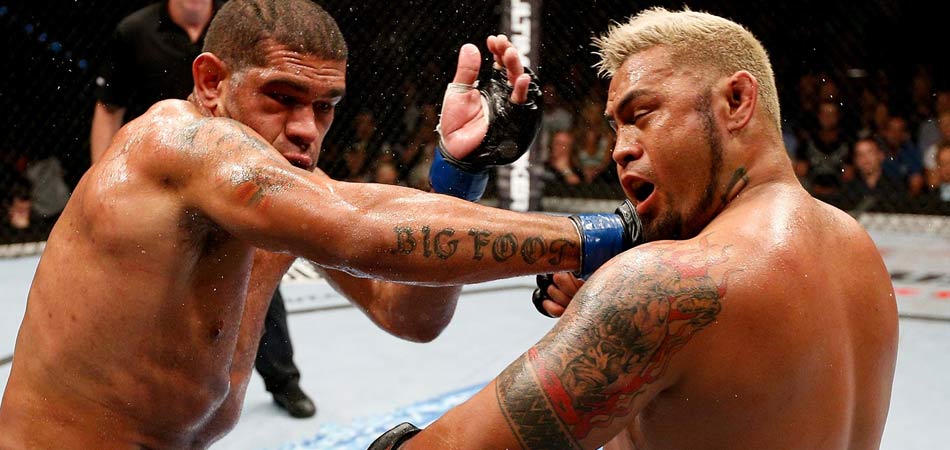How many times have we been in universal euphoria after a fight, only to be bombarded by the disappointment of a fighter failing a drug test?
It’s countless.
Antonio “Bigfoot” Silva is the latest fighter to be caught in the TRT web. He entered the bout over the allowable limit for testosterone in his instant classic against Mark Hunt. It’s unfortunate for Silva, who lost his well-deserved Fight of the Night bonus. But it’s also unfortunate for everyone involved in mixed martial arts that the greatest heavyweight bout (arguably) in UFC history has been tainted.
Remember when Anderson Silva rebounded from a four-and-a-half round clobbering from Chael Sonnen with a triangle choke? The MMA world was buzzing – until Sonnen tested positive for elevated testosterone levels. It somewhat soiled one of the most memorable events in UFC history; but it also ingrained Testosterone Replacement Therapy (TRT) into our consciousness.
Since then, we can’t get away from it. It seems as though fighters have been applying in droves. They’ve flocked to their personal physicians to have their testosterone level’s checked – in the hopes that they qualify for a boost.
Okay, maybe I’m exaggerating the number of fighters on TRT – and the number who have applied. But, there is a significant sample of talent under the UFC banner that uses the treatment.
The TRT ‘loop-hole’
The majority of the fighters that use TRT are older, for obvious reasons. When you grow older, your testosterone levels decrease which subsequently decreases your athletic abilities, and perhaps, make you more lethargic. It’s natural.
So making a case for older athletes to be allowed to use TRT is rational, to a degree.
However, I don’t see the rationality to consent a fighter to rejuvenate themselves using the TRT ‘loop-hole’ when they have failed a drug test in the past. It’s been proven that individuals who have a history of anabolic steroid use can acquire serious side-effects once they stop, including low testosterone.
I don’t like jumping on the pick-on-Vitor-Belfort-bandwagon, but it is important to note that he has failed a drug test for steroids in the past – yet he is granted an exemption to use TRT. This seems strange to me – especially when you look at his physique.
Dr. Johnny Benjamin, a medical columnist at MMAJunkie.com, has discussed this topic on a number of occasions, and is far more qualified than me to talk about the subject. Writing about banning TRT, and how many fighters it would affect – he estimated it would affect less than 1 percent of elite fighters.
He made another an interesting observation.
“It would be extremely difficult for a man to have the physical wherewithal to progress to an elite professional level of MMA having untreated low T since his pre-teen years.” He wrote. “Simply put, such a young man wouldn’t have the muscle mass and strength needed to succeed in MMA and reach the elite level.”
It’s curious, especially in Belfort’s case. How can a man suffering from low testosterone have such an Adonis-like physique? It seems absurd to me.
The fairness of TRT
Personally, I think that the use of testosterone replacement therapy should be banned – and that any use of artificial testosterone should be permanently outlawed. This should be implemented across the board, for everybody, because the grey-area that currently exists is unmanageable and extremely difficult to regulate.
Allowing older athletes to receive a boost in their testosterone doesn’t seem fair to me – but maybe my age compels me to side with the younger generation. However, I wouldn’t consider myself biased against the older fighters receiving the treatment. I grew up as an enormous admirer of Dan Henderson, and I still remain a massive advocate of him – but I don’t agree with his use of TRT.
Henderson has never been popped for banned substances – that must be clear. So that isn’t why I disagree with his use of TRT. I oppose it because I don’t think it’s fair.
The argument for TRT is that the fighter is simply increasing his levels to where they should be – it isn’t cheating, it’s levelling the playing field. Fair enough, but I don’t necessarily find that to be a completely compelling argument.
Take a young fighter for example – he’s 3-0 in his MMA career, and is looking to challenge a veteran in a step up in competition. The veteran has a wealth of experience inside the cage. He is comfortable in there – it’s just another fight. But on the other hand, the young-gun has the youth, the vigour, and the vitality. He’s faster, more durable, and can train like a young man should.
But the veteran, who has the experience of tons of contests, is on TRT. Now that veteran can train at a level that a fighter of his age couldn’t without the treatment. He has closed the gap, artificially, between his younger opponent and himself (not entirely, but a significant amount). However, the youngster can’t gain the experience and cage-time that the veteran has with simple treatment. That seems unfair.
This issue must be addressed by the athletic commissions, but it would surprise me if anything was done in the near future. Commissions are government run organisations, and they’re forever resistant to change. It’s clear with the judging situation, and it’s clear with the issue of testosterone replacement therapy.
